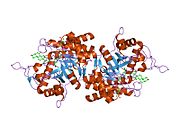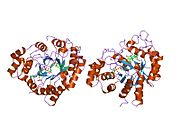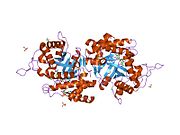AKR1C1: Difference between revisions
m added link to portal |
|||
| Line 31: | Line 31: | ||
{{PDB Gallery|geneid=1645}} |
{{PDB Gallery|geneid=1645}} |
||
{{Alcohol oxidoreductases}} |
{{Alcohol oxidoreductases}} |
||
{{ |
{{Enzymes}} |
||
{{Portal bar|Molecular and Cellular Biology|border=no}} |
|||
[[Category:EC 1.1.1]] |
[[Category:EC 1.1.1]] |
||
Revision as of 08:19, 31 December 2015
Template:PBB Aldo-keto reductase family 1 member C1 also known as 20α-hydroxysteroid dehydrogenase, 3α-hydroxysteroid dehydrogenase, and dihydrodiol dehydrogenase 1/2 is an enzyme that in humans is encoded by the AKR1C1 gene.[1][2]
This gene encodes a member of the aldo/keto reductase superfamily, which consists of more than 40 known enzymes and proteins. These enzymes catalyze the conversion of aldehydes and ketones to their corresponding alcohols by utilizing NADH and/or NADPH as cofactors. The enzymes display overlapping but distinct substrate specificity. This enzyme catalyzes the reduction of progesterone to the inactive form 20-alpha-hydroxy-progesterone. This gene shares high sequence identity with three other gene members, and is clustered with those three genes at chromosome 10p15-p14.[2]
References
- ^ Ciaccio PJ, Tew KD (Jun 1994). "cDNA and deduced amino acid sequences of a human colon dihydrodiol dehydrogenase". Biochimica Et Biophysica Acta. 1186 (1–2): 129–32. doi:10.1016/0005-2728(94)90144-9. PMID 8011662.
- ^ a b "Entrez Gene: AKR1C1 aldo-keto reductase family 1, member C1 (dihydrodiol dehydrogenase 1; 20-alpha (3-alpha)-hydroxysteroid dehydrogenase)".
Further reading
- Ciaccio PJ, Jaiswal AK, Tew KD (Jun 1994). "Regulation of human dihydrodiol dehydrogenase by Michael acceptor xenobiotics". The Journal of Biological Chemistry. 269 (22): 15558–62. PMID 7515059.
- Khanna M, Qin KN, Cheng KC (Jun 1995). "Distribution of 3 alpha-hydroxysteroid dehydrogenase in rat brain and molecular cloning of multiple cDNAs encoding structurally related proteins in humans". The Journal of Steroid Biochemistry and Molecular Biology. 53 (1–6): 41–6. doi:10.1016/0960-0760(95)00019-V. PMID 7626489.
- Khanna M, Qin KN, Klisak I, Belkin S, Sparkes RS, Cheng KC (Jan 1995). "Localization of multiple human dihydrodiol dehydrogenase (DDH1 and DDH2) and chlordecone reductase (CHDR) genes in chromosome 10 by the polymerase chain reaction and fluorescence in situ hybridization". Genomics. 25 (2): 588–90. doi:10.1016/0888-7543(95)80066-U. PMID 7789999.
- Lou H, Hammond L, Sharma V, Sparkes RS, Lusis AJ, Stolz A (Mar 1994). "Genomic organization and chromosomal localization of a novel human hepatic dihydrodiol dehydrogenase with high affinity bile acid binding". The Journal of Biological Chemistry. 269 (11): 8416–22. PMID 8132567.
- Deyashiki Y, Ogasawara A, Nakayama T, Nakanishi M, Miyabe Y, Sato K, Hara A (Apr 1994). "Molecular cloning of two human liver 3 alpha-hydroxysteroid/dihydrodiol dehydrogenase isoenzymes that are identical with chlordecone reductase and bile-acid binder". The Biochemical Journal. 299 ( Pt 2) (2): 545–52. PMC 1138306. PMID 8172617.
- Qin KN, New MI, Cheng KC (Dec 1993). "Molecular cloning of multiple cDNAs encoding human enzymes structurally related to 3 alpha-hydroxysteroid dehydrogenase". The Journal of Steroid Biochemistry and Molecular Biology. 46 (6): 673–9. doi:10.1016/0960-0760(93)90308-J. PMID 8274401.
- Stolz A, Hammond L, Lou H, Takikawa H, Ronk M, Shively JE (May 1993). "cDNA cloning and expression of the human hepatic bile acid-binding protein. A member of the monomeric reductase gene family". The Journal of Biological Chemistry. 268 (14): 10448–57. PMID 8486699.
- Hara A, Matsuura K, Tamada Y, Sato K, Miyabe Y, Deyashiki Y, Ishida N (Jan 1996). "Relationship of human liver dihydrodiol dehydrogenases to hepatic bile-acid-binding protein and an oxidoreductase of human colon cells". The Biochemical Journal. 313 ( Pt 2) (2): 373–6. PMC 1216918. PMID 8573067.
- O'connor T, Ireland LS, Harrison DJ, Hayes JD (Oct 1999). "Major differences exist in the function and tissue-specific expression of human aflatoxin B1 aldehyde reductase and the principal human aldo-keto reductase AKR1 family members". The Biochemical Journal. 343 Pt 2 (2): 487–504. doi:10.1042/0264-6021:3430487. PMC 1220579. PMID 10510318.
- Nishizawa M, Nakajima T, Yasuda K, Kanzaki H, Sasaguri Y, Watanabe K, Ito S (Feb 2000). "Close kinship of human 20alpha-hydroxysteroid dehydrogenase gene with three aldo-keto reductase genes". Genes to Cells. 5 (2): 111–25. doi:10.1046/j.1365-2443.2000.00310.x. PMID 10672042.
- Zhang Y, Dufort I, Rheault P, Luu-The V (Oct 2000). "Characterization of a human 20alpha-hydroxysteroid dehydrogenase". Journal of Molecular Endocrinology. 25 (2): 221–8. doi:10.1677/jme.0.0250221. PMID 11013348.
- Nahoum V, Gangloff A, Legrand P, Zhu DW, Cantin L, Zhorov BS, Luu-The V, Labrie F, Breton R, Lin SX (Nov 2001). "Structure of the human 3alpha-hydroxysteroid dehydrogenase type 3 in complex with testosterone and NADP at 1.25-A resolution". The Journal of Biological Chemistry. 276 (45): 42091–8. doi:10.1074/jbc.M105610200. PMID 11514561.
{{cite journal}}: CS1 maint: unflagged free DOI (link) - Chen CY, Hsu CP, Hsu NY, Shih CS, Lin TY, Chow KC (2002). "Expression of dihydrodiol dehydrogenase in the resected stage I non-small cell lung cancer". Oncology Reports. 9 (3): 515–9. doi:10.3892/or.9.3.515. PMID 11956619.
- Yang MD, Wu CC, Chiou SH, Chiu CF, Lin TY, Chiang IP, Chow KC (2003). "Reduction of dihydrodiol dehydrogenase expression in resected hepatocellular carcinoma". Oncology Reports. 10 (2): 271–6. doi:10.3892/or.10.2.271. PMID 12579257.
- Nakajima T, Yasuda K, Nishizawa M, Okada H, Yoshimura T, Ito S, Kanzaki H (Feb 2003). "Expression of 20alpha-hydroxysteroid dehydrogenase mRNA in human endometrium and decidua". Endocrine Journal. 50 (1): 105–11. doi:10.1507/endocrj.50.105. PMID 12733716.
- Couture JF, Legrand P, Cantin L, Luu-The V, Labrie F, Breton R (Aug 2003). "Human 20alpha-hydroxysteroid dehydrogenase: crystallographic and site-directed mutagenesis studies lead to the identification of an alternative binding site for C21-steroids". Journal of Molecular Biology. 331 (3): 593–604. doi:10.1016/S0022-2836(03)00762-9. PMID 12899831.
- Agapova OA, Yang P, Wang WH, Lane DA, Clark AF, Weinstein BI, Hernandez MR (Oct 2003). "Altered expression of 3 alpha-hydroxysteroid dehydrogenases in human glaucomatous optic nerve head astrocytes". Neurobiology of Disease. 14 (1): 63–73. doi:10.1016/S0969-9961(03)00101-3. PMID 13678667.





